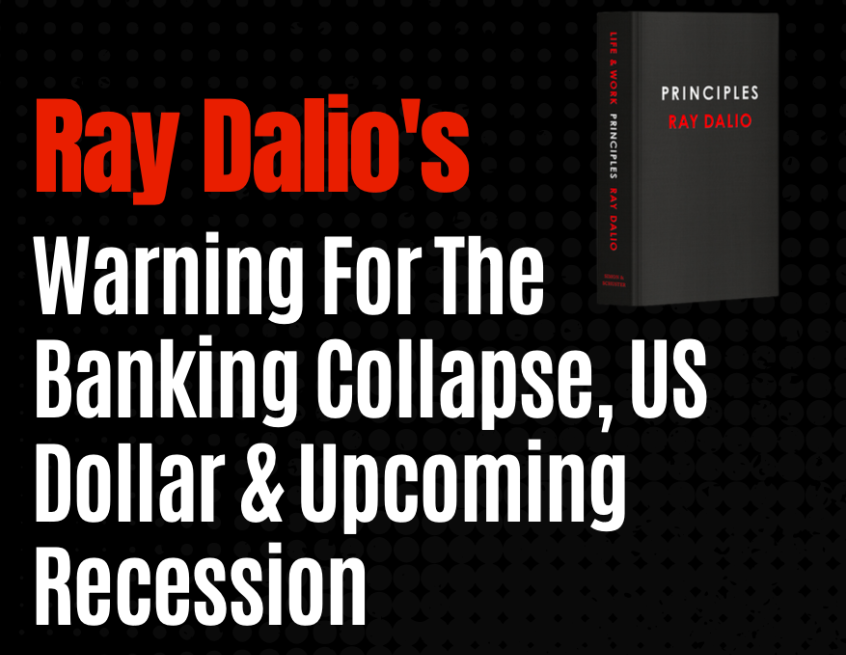Sundays are often reserved for relaxation and leisure, but what if I told you that spending a part of your Sunday learning about macroeconomics could significantly impact your future? In this article, we will delve into the fascinating world of macroeconomics and explore its relevance in today’s ever-changing global landscape. So, grab a cup of coffee, get comfortable, and let’s embark on this enlightening journey.
Ray Dalio’s Insight: The Principles of the Changing World Order
Our journey begins with a brief summary of Ray Dalio’s thought-provoking book, “The Principles of the Changing World Order.” Ray Dalio, a renowned economist and investor, warns us about the impending challenges the world is facing, particularly in the realms of banking, the US dollar, and an upcoming recession.
The Cycles of Growth and Downfall
As history has shown, the world goes through cycles – cycles of growth and cycles of downfall. These cycles are often influenced by five major forces that shape large economies, or “empires.”
Major Forces of History
- Debt Creation and Money Generation: The continuous creation of debt and the generation of money play a pivotal role in shaping the economic landscape.
- Wealth Inequality and Populism: Rising wealth inequality often leads to populism, which can have profound effects on global powers like China and Russia.
- External Factors and Technological Advancements: Natural disasters and technological advancements can drastically influence economies and their trajectories.
The current biggest empire is arguably the United States, and it appears to be in a declining phase.
Current Phase: Challenges and Concerns
Presently, we find ourselves in a phase characterized by:
- Declining Empires: Many empires are experiencing a decline in their global influence.
- The Rise of New Superpowers: Emerging nations are on the ascent, challenging the existing global power structure.
- Escalating Debt Bubbles: The world faces a growing debt crisis that threatens financial stability.
- Growing Concerns about Financial System Collapses: As we navigate this precarious phase, concerns about potential financial system collapses loom large.
During such declining phases, financial institutions are particularly vulnerable. A historical example is the Roman Empire, which debased its currency, signaling its decline. Although we don’t mint gold coins today, the devaluation of the US dollar remains a pressing concern.
Banking Challenges and the Debt Dilemma
Banks are confronted with enduring challenges, including:
- Managing Deposits: Banks must efficiently manage deposits from various sources.
- Handling Fluctuating Debt Values: Debt values are far from stable, which complicates financial decision-making.
- Responding to Interest Rate Changes: Shifting interest rates pose challenges for banks in managing their portfolios.
- Operating with Fractional Reserves: Operating with fractional reserves requires a delicate balance.
The debt-to-GDP ratio is reaching an all-time high and continues to grow. Moreover, the debt is taking on toxic qualities, causing uncertainty among investors about the long-term debt scenario. Debt default appears to be on the horizon.
Impact of Interest Rates
Changes in interest rates can trigger:
- Inflation: Eroding the value of assets and affecting various sectors.
When an empire becomes financially weak, it leads to different sets of problems, many of which we may already be witnessing.
Historical Lessons and Coping Strategies
Historical precedent teaches us that financial crises can lead to:
- The Emergence of Populism: As people face economic hardship, populist movements often gain traction.
- Internal Conflicts: Economic crises can strain the social fabric, leading to internal conflicts.
- A Shift Away from Democratic Systems: In times of crisis, democratic systems may come under scrutiny.
How can we navigate these challenges? Strategies include diversifying investments across asset classes, avoiding excessive commitment to any single investment, and preparing for a range of potential scenarios. Unfortunately, the world’s current disposition often lacks collaboration, which could destabilize the US dollar sooner than anticipated.
Dollar’s Vulnerability and the Path Forward
The US dollar’s position as a global reserve currency faces threats due to:
- Holding by Other Nations: Other nations increasingly hold US dollars, challenging its dominance.
- Use of Sanctions as a Geopolitical Tool: The use of sanctions in global politics can undermine the dollar’s stability.
- Shifts in Global Trade Dynamics: Changing dynamics in global trade can impact the dollar’s role.
To preserve the dollar’s status, measures must be taken to ensure its financial strength, refrain from weaponizing financial sanctions, and address the issue of excessive debt. This shift could mark a significant change in our lifetime.
In Conclusion
As we conclude our journey through the world of macroeconomics and its impact on our future, it becomes clear that the economic landscape is in a state of flux. By understanding the challenges and trends that lie ahead, we can better prepare ourselves for what the future may hold.
So, on this Sunday, take a moment to reflect on the changing world order and how it might affect your financial well-being. The words of Ray Dalio serve as a reminder: “To be financially strong requires you to not spend more than you earn.” It’s time to be proactive and make informed decisions for a more secure future.
Frequently Asked Questions (FAQs)
- What are the major forces that shape empires according to Ray Dalio? Ray Dalio identifies five major forces: debt creation and money generation, wealth inequality leading to populism, external factors like natural disasters, and technological advancements.
- Why is the current phase characterized by declining empires and growing concerns about financial system collapses? The current phase is marked by a decline in established empires, the rise of new superpowers, escalating debt bubbles, and concerns about potential financial system collapses due to the challenges faced by these empires.
- How do interest rates impact economies and financial systems? Changes in interest rates can lead to inflation, erode the value of assets, and create economic imbalances that affect various sectors.
- What are some coping strategies for navigating economic challenges? Strategies include diversifying investments, avoiding excessive commitment to a single investment, and preparing for various potential scenarios.
- Why is the US dollar’s status as a global reserve currency under threat? The US dollar faces threats due to its holding by other nations, the use of sanctions as a geopolitical tool, and shifts in global trade dynamics. Measures must be taken to preserve its status.


